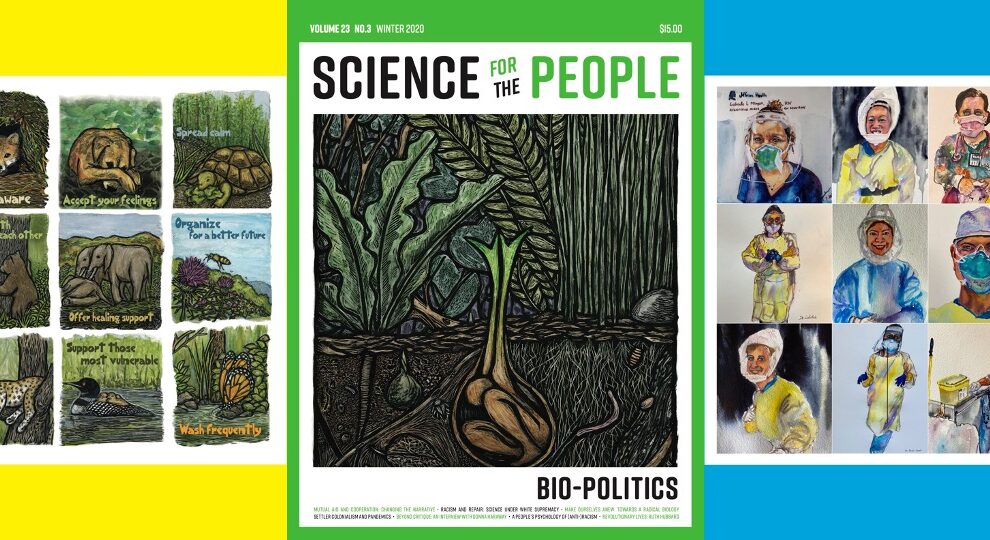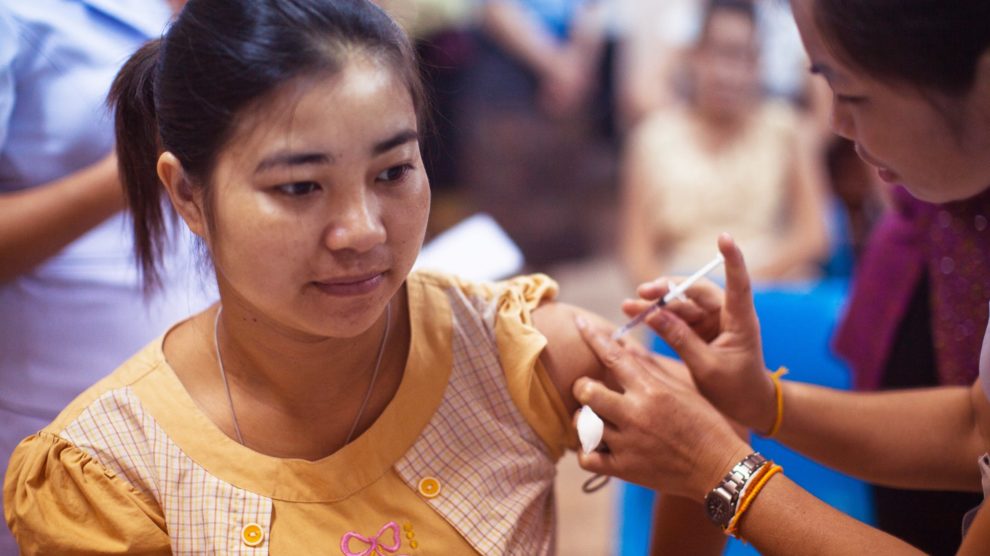Spring/Summer 2021 Organizing Reports
Reports from BIPOC Caucus, Translation Working Group, People’s Science Network, Atlanta, Albert Einstein College of Medicine, & Cambridge
Volume 24, Number 1, Racial Capitalism
Jump to:
- BIPOC Caucus
- Translation Working Group
- People’s Science Network
- Atlanta, Georgia
- Albert Einstein College of Medicine
- Cambridge, England
You can find previous organizing reports here.
BIPOC Caucus
Contact: BIPOC@scienceforthepeople.org
By Ed Romano & Sara Gutiérrez
The seed for a BIPOC (Black, Indigenous, People of Color) caucus was planted during a conversation between SftP members Lisette Torres-Gerald and Ben Allen in 2015 just as the organization was being revitalized. This was followed by an attempt by Lisette to generate interest in the caucus and then a final call to action in 2018. The initial BIPOC group participated vigorously in crafting SftP’s Principles of Unity to ensure its language would not “other” marginalized groups and ways of knowing. While documentation of these early years of work are scarce, the labor of BIPOC scientists to restructure and transform SftP is at the root of the caucus’ presence.
The current articulation of the BIPOC Caucus grew out of the explosive protests of summer 2020 after the murders of George Floyd and Breonna Taylor. In response, SftP organized a Black Lives Matter panel and survey to generate discussion within the organization about how racialized violence spurred by anti-Blackness manifests socially within our institutions, professional/social circles, and worldviews, as well as how to resist it. The panel gave context to the uprisings, the history of anti-Blackness, and its conjunctions with science. Panelists included organizers outside SftP, as well as original SftP member and Black Panther, Sam Anderson. An organization-wide survey was administered immediately after the panel to solicit input on how SftP could best contribute to the Movement for Black Lives and promote anti-racism inside and outside of academia. As the survey acknowledged, 37 percent of SftP’s current leadership are people of color, but only 3 percent identify as Black American. The political moment urges critical reflection as to why such disproportionate numbers persist in our spaces and in the wider sciences.
To further extend space for discussion, the BIPOC Caucus formulated the pitch for this “Racial Capitalism: Contagion, Conflict, and Climate Change” issue of the magazine. Like the original POC group, the current BIPOC Caucus deliberated on whether its role would include educating members of SftP about historic and current marginalization and exploitation of BIPOC communities in the name of science, and to ensure SftP centers anti-racism within and beyond its structures. After collectively writing the issue pitch, the Caucus has continued debating its mission and goals, which, while still emergent, no longer includes serving as educators about racism to white members of SftP or as a testament to any successful finale achieved by SftP in grappling with its history with racism.
We acknowledge the widespread burn-out of BIPOC scientist-organizers; they are at capacity and unable to continue producing work exclusively for the audience of white scientists. The BIPOC Caucus exists to create and hold space for our BIPOC members to recover, build community, support junior STEM workers, and cultivate the critical consciousness needed in the sciences. Our long-term goals include expanding outreach, relational organizing, and developing a system of peer support for our Caucus members. We also want to be in solidarity with those working internationally for alternative future(s). Here, we feel compelled to share the words of Zapatista Subcomandante Galeano at the 2016 Zapatista Army of National Liberation (EZLN)-hosted science conference, L@s Zapatistas y las ConCiencias por la Humanidad (The Zapatistas and the ConCIENCIAS for Humanity):
“Brother and sister compañer@ scientists, as Zapatistas we think that science itself is a series of knowledges that can help us to develop a more human system, where our dreams of unity and the conservation of Mother Earth and living beings can be possible. Simultaneously, they will help us to soon destroy this capitalist monster. So we ask, is there room for your dreams, your knowledges and your science in the world of oppression? Is there room for your dreams within dispossession, horror, fear and the extermination of life? Do you believe that science can humanize in conjunction with the peoples of the countryside and the city?”
We resoundingly echo this cry for a people’s institution of science, and believe that liberation and welfare, instead of profiteering, should guide the work of STEM laborers. It is imperative that we are led by the Zapatistas and other BIPOC perspectives in paving the road to a liberated field of scientific inquiry.
All who self-identify as BIPOC are welcome to join our monthly meetings where we discuss articles, plan our next events, and build collective power among BIPOC scientists. If you are interested in being a part of the BIPOC Caucus, fill out our SftP BIPOC Caucus Introductions form or email BIPOC@scienceforthepeople.org.
Translation Working Group
Contact: sftp.translation@gmail.com
By Esther Sánchez García
In December 2019, a group of eleven Science for the People members formed a Translation Collective with the capacity to translate between English and Spanish, Arabic, French, Portuguese, Korean, Danish, and Amharic. In mid-January of this year, we were established as a working group with representation in the SftP Steering Committee.
With the goal of making Science for the People magazine and website articles accessible to a more diverse audience, we are beginning to create style guides for the languages we translate and to address larger issues around language, such as the unintelligibility of much academic writing.
We also began doing simultaneous interpretation for events, most recently for the March 5, 2021 webinar with Rob Wallace, author of Big Farms Make Big Flu, about his new book Dead Epidemiologists. Prior to that, we provided simultaneous interpretation for the People’s Green New Deal teach-ins.
Thanks to growing membership in the Translation Working Group, the magazine now accepts submissions in languages beyond English. We began translating articles into or from Spanish, French, and Arabic for the “Science Under Occupation” (Spring 2020) issue, and will continue this practice going forward, with three or four translations being published in each issue. You can find all translated and original articles at magazine.scienceforthepeople.org.
We look forward to expanding our capacity with each issue to translate more articles in languages that can reach more people! Get in touch with us if you’d like to help out.
People’s Science Network (PSN)
Contact: mail@pplsci.net
By Ben Allen
Did you know that Science for the People magazine has a fiscal sponsor, People’s Science Network (PSN)? PSN acts as a fundraising and fiscal sponsorship body for SftP, supporting the longevity and impact of our magazine publication and the organizing projects of our affiliated groups. We raise money to support the valued labor of our contributing writers and artists and for our numerous organizing projects. Operations are currently managed by a volunteer-based Board of Directors and an Advisory Council. Board members assume responsibilities to promote PSN and vote on proceedings during quarterly meetings. At present, the Board consists of a president and two co-secretaries, and the Advisory Council is composed of various actors involved in the organizing and publishing work of SftP and its affiliates. Together, these bodies support PSN by providing knowledge, expanding outreach and contacts, and guiding our fiscal strategy and development. We are always seeking new ideas that support these goals and the overall agenda of SftP. If you are interested in volunteering for the Board or Council, don’t hesitate to reach out to mail@pplsci.net.
What’s PSN been up to? SftP incorporated PSN in Winter 2018. Since then, the SftP Steering Committee and Publications Committee has used PSN as a fiscal vehicle to support initiatives across SftP. A subset of people from these committees applied for 501c3 non-profit status for PSN with the Internal Revenue Service in late September. In November, we were notified that our application had been accepted! PSN now operates as a recognized 501c3 non-profit organization.
What’s next for the PSN? We are still working out the next steps, but are looking forward to sharing an annual briefing with SftP and organizing a fundraising meeting in 2021. This is intended to benefit all SftP affiliates and raise awareness about the utility of our non-profit status towards advancing our publication and organizing goals. Additionally, we are working with the Steering and Publishing Committees to streamline communications tools across SftP to better engage our members and the broader public. Stay tuned for more announcements coming to a chapter near YOU!
You can support PSN by making a tax-deductible donation via mailing a check to:
People’s Science Network
PO Box 3817
Knoxville, TN 37927
The People’s Science Network Board of Directors:
Ben Allen – President
Andrew Butts – Co-secretary
Ashley Theissen – Co-secretary
Atlanta, Georgia
Contact: https://www.facebook.com/sftpatlanta
By Mark Colasurdo
Over the past year, our chapter has focused on racial justice in STEM and broadening our connections to surrounding Atlanta communities. In collaboration with two graduate student unions, EmoryUnite! and United Campus Workers Georgia (UCWGA) at Georgia Tech, the Atlanta SftP chapter hosted a virtual community forum during the #Strike4BlackLives and #ShutDownSTEM of June 10, 2020. This proved to be a pivotal space for assembling actors to coalesce over issues of policing on college campuses, its impact on neighboring communities, and the recent murder of a student having a mental health crisis by Georgia Tech Police.
There has been substantial crossover between our chapter and the local Democratic Socialists of America (DSA). As a result, SftP membership bridges different groups within DSA (e.g., AfroSocialist and Socialists of Color or AFROSOC Caucus) and DSA’s wider network (e.g., Community Movement Builders). These added ties anchor and strengthen coalitions, enhancing capacity and responding to the organizing needs of the moment. As one illustration, we held an “Abolish the Police” teach-in with the AFROSOC Caucus and Community Movement Builders on July 18, 2020 in response to the murder of Rayshard Brooks in Grant Park on June 12. At an outdoor gathering of more than 30 people, we critically examined the role of science and technology in police militarization, surveillance, and resistance. We also discussed how activists and individuals can protect themselves from police while on the streets. We strive to deepen our commitments in solidarity with the struggle for Black lives.
Albert Einstein College of Medicine
Contact: sftp.at.einstein@gmail.com
By SftP at Einstein
In July 2020, a new chapter of Science for the People (SftP) was formed at the medical school and biomedical research campus of Albert Einstein College of Medicine. Located in the Bronx, New York, our chapter is largely composed of graduate students. We organized in direct solidarity with the anti-racism and anti-police brutality movements. These movements and the issues underlying them generated a sense of urgency that led to strong interest and attendance at our early meetings.
One of our first actions as a chapter was to hold elections to designate the roles of our early members. This process established a transparent and democratic structure to sustain participation that could accommodate inevitable fluctuations in student members’ capacity and availability. The elected roles of our chapter include a chapter chairperson and organizers for our education series, communications, campus and community activism (with a focus on union solidarity and supporting off-campus local organizing), and “assembly floor outreach” (to expand chapter membership among campus workers like postdocs and research technicians). Fostering individual relationships and friendships that centered a mutual interest in social transformation proved very helpful throughout our organizing.
Not to be constrained by the pandemic, we focused on creating an online presence through an education series on Zoom and hosting panel discussions that were open to the entire campus community. Our anti-racist education series addressed police brutality, voter disenfranchisement, and the policy of busing students across school districts to mitigate de-facto segregation in schools. The panel discussions involved SftP revival members and SftP allies and sought to activate community discourse around radical science. These programs established our chapter’s consistent presence on campus and created an open space for political discussions. Our other initiatives included supporting a petition with two campus unions (NYSNA and SEIU1199) in solidarity with the nurses’ strike for safer pandemic working conditions during their contract stalemate against the school’s parent hospital network, Montefiore Medical Center.
We have oriented towards several new initiatives for 2021, including petitioning for recognition as a formal student organization. Having this formal status supports our organizing goals by providing a source of funding and raising awareness about our presence on campus. We will resume our education series with discussions on environmentalism, LGBTQIA+ liberation, and a vision plan for a people-centered science under the Biden administration.
The main advice we can give to others who are looking to build up SftP chapters is that you are not alone. Wherever you work or study, there are most certainly like-minded people around you who will respond to patient but persistent calls to get involved. We believe that there is still great interest in topics like activism, social justice, and socialism among scientists and the general population. The momentous energy driving social movements inspired by Black Lives Matter needs to be harnessed in order to dismantle entrenched racism and the neoliberal approach to science and medicine. There has never been a better time to get organized!
Cambridge, England
Contact: https://www.facebook.com/SftPCambridge | sftpcambridge@gmail.com
By Clemens von Stengel
Here in Cambridge, England, Science for the People (SftP) has established its first chapter outside of North America. Student-led campaigns and civic mobilization for climate justice and demilitarization have been on the rise in the United Kingdom, along with organizing in solidarity for workers’ rights and striking staff at the University of Cambridge. At first glance, protest and political engagement can appear low among STEM students and staff. But a closer look reveals an untapped desire for collective organizing in STEM, from laboratory benches to the picket lines and political discussions at science events. In this climate, a few like-minded organizers hosted teach-outs on campus and created reading groups covering scholarship that teases out the political nature of science. One regular participant encountered SftP magazine’s online issue, “The Return of Radical Science” (Spring 2019), and after a session where everyone read a different article, a new chapter of SftP came to life.
Our initial aim for the chapter is to lay the groundwork for sustainable organizing by hosting consistent events and connecting with local activist groups at the University of Cambridge and beyond. We hope to foster community via informal online discussions amid pandemic mandates on social distancing. To date, we have held two online events: the first, to introduce SftP, and the second, a panel discussion on “Science as a Form of Resistance.” Planning for more events is underway. Several of our members are also involved in the climate justice group Zero Carbon, which organized a successful campaign for the university to divest from fossil fuels. They are continuing this work by investigating the university’s wider links with extractive industries. We will reach out to people outside of the university, from local activist groups to unions and community members interested in joining. With a national lockdown and connections limited to the virtual, there is potential for collaborating with people across the country. Anyone interested either in setting up a chapter in the United Kingdom or joining ours should reach out to us!





